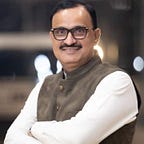Praveen Kakkar- Our Festivals are the Greatest Heritage of Cultural Unity
These days the whole of India is immersed in the colors of festivals. After almost two years, Corona’s intensity has somewhat decreased, allowing individuals to take part in public events. Maa Durga’s idols were erected during Navratri (Navratri 2021), and the Goddess was ceremoniously worshipped for nine days. On the Tenth day, the celebration of Vijayadashami began, and people eagerly took part in setting the Ravana effigy fire. In this sequence of festivals, Eid Milad un Nabi, Deepwali, and Valmiki Jayanti are also going to come soon. All these festivals are so ingrained in our lives. In actuality, a harmonious society is established via all of these holidays since they are so deeply embedded in our civilization and culture.
On ordinary days, we only feel enthusiastic when we laugh and grin with our loved ones or friends, but during festivals, India as a whole is enveloped in an atmosphere that makes everyone naturally happy. In Indian philosophy, this sense of simultaneous joy across the whole human race is known as Pramod Bhava. When the idols are submerged at the end of Navratri, young men and women accompany the idol of Goddess Durga to a specific location while beating drums.
They sing and dance all the way and are drenched in religious devotion. On the day of Vijayadashami, we all witnessed hundreds of people cheering to see the burning of Ravana, the embodiment of evil. The Prophet Muhammad was born on Eid ul Milad, while Maharishi Valmiki, the author of the Ramayana, India’s most cherished scripture, is honored on Valmiki Jayanti. After defeating Ravana, Lord Ram comes to Ayodhya for the Diwali festival, where he is greeted by both men and women by burning lamps. That is why this is the festival of lights.
Our culture very gracefully added economic and social activities to these festivals. During this time, there are numerous large-scale fairs, crowded markets, Ramlila celebrations, a variety of activities in both large and small cities, and a lot of shopping going on. They purchase new cars, buy new clothes, decorate their homes, and engage in a host of other enthusiastic activities that are subtly connected to economic activity. In a way, this festival is the oldest wheel of our religion and culture as well as our economy. This allows the wealthy to spend and the underprivileged to obtain new sources of income.
The artisans comprise the majority of those who create the idols of Lord Ganesha, Maa Durga, and Ravana. Their entire business is dependent on this one-and-a-half-month period, and they work extremely hard throughout the year. This class has experienced extreme economic hardship for the past two years due to the epidemic and lockdown; in light of this, it is anticipated that, in the same peaceful and joyful manner as previous festivals, the upcoming ones will likewise pass without any health crises.
These holidays provide an opportunity for religious and cultural exchange as well as an understanding of one another’s customs and rituals among people of different religions. In this case, a Hindu may comprehend the benefits humanity received from the arrival of Prophet Hazrat Mohammad Sahib, and Muslims can comprehend how Lord Ram gave peace to the world by defeating the demons, or the wicked. Made a habitable place for man and holy souls. In addition to honoring Maharishi Valmiki on Valmiki Jayanti, the Valmiki community also takes pride in the fact that Maharishi Valmiki, a member of their community, wrote the Valmiki Ramayana, the most significant work in Hindu history. In this way, these festivals also work to eliminate the barriers of caste and discrimination in India.
The Joy of Shared Festivities
Collective festival celebration is one of the characteristics of a harmonious community. People happily take part in each other’s celebrations, regardless of differences in religion or culture. Individuals from diverse origins benefit from this cross-cultural interchange in terms of tolerance, understanding, and a sense of belonging. The Teej festival, traditionally celebrated by women, becomes a symbol of unity as women from various communities come together to participate in the revelry.
When people of every religion and every caste of society are equally happy. The fusion of all these traditions produces a magnificent Indian culture when individuals take part in one another’s Teej celebrations. This is the culture of India which is locked upon with reverence and respect all over the world. Mutual brotherhood and affection are the foundation for preserving this civilization’s honor and respect, which we must defend at all costs.
It is also a bitter truth that sometimes some Anti-social elements use these religious festivals to fulfill their evil intentions use these religious festivals to fulfill their evil intentions and create disharmony in society. Naturally, we will all continue to be on the lookout for these forces and actively participate in any endeavor that strengthens the bonds of love between all religions and unites India. Together, let us pray to God for continued good health, the removal of the epidemic’s shadow from India, and the ability for people to travel around and conduct business as usual, allowing everyone’s stove to burn in their homes. May everyone’s houses be filled with joy and may God, Allah, Waheguru, dwell in our hearts and homes.
Also Read:
Praveen Kakkar- Republic Day is an Opportunity to Remember Civil Rights and Duties
